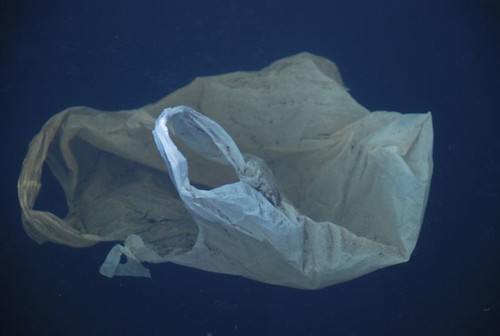歐洲議會環境委員會10日核准了一份一次性輕量型塑膠袋減量報告書,該報告書對於全歐盟28個會員國提出兩階段減量目標的建議。
歐洲議會是以歐盟執委會先前的相關提案為基礎,展開包裝廢棄物法規的修訂,並由環境、公共衛生和食品安全委員會的事前影響評估小組編撰這份報告,讓修法進度又往前進了一步。
修法目的在於鼓勵垃圾和輕量型(厚度50微米以下)塑膠袋的減量。輕量型塑膠袋是歐洲陸地和水域的主要垃圾之一。
垃圾處理莫可奈何 輕量型塑膠袋百年不壞
報告書指出,「這些塑膠袋會逃離垃圾管理系統,並在環境中不斷累積。絕大多數塑膠袋以碎片形式在環境中持續數百年不壞。」
2010年,在歐洲有超過80億個塑膠袋最終成為垃圾。每一位歐洲公民平均使用198個塑膠袋,其中有9成是免洗輕量塑膠袋。
年人均塑膠袋使用量在28個會員國間則有顯著的差異。最先進的國家如丹麥和芬蘭,年人均使用量約4個;發展表現最差的國家如波蘭、葡萄牙、斯洛維尼亞、斯洛伐克、愛沙尼亞,拉脫維亞和立陶宛,年人均使用量可高達466個。
歐盟採兩階段減量 成員國自訂實施機制
報告書作者Alison Davies歸納出4種方案:
- 維持現狀
- 由零售商自願承諾停止使用塑膠袋
- 設立全歐盟的塑膠袋減量目標與相關經濟工具
- 全歐盟禁用免洗塑膠袋
歐洲執委會傾向第3個方案,建議以兩階段的塑膠袋減量目標,在法規生效後3年內減少50%的塑膠袋用量,到了2020年,也就是5年內減少80%。此目標的計算依據是歐盟人均消耗量,因此不同的成員國需要下的功夫不同。
報告書建議,要達成此目標,成員國最基本的工作是確保食品量販業者不免費提供消費者塑膠袋,必須收取額外費用。實際運作機制則交由各成員國自行設計。
這些措施可能讓歐洲失去部分工作機會。報告書估算,歐盟約有250至300家塑膠袋製造商、15,000至20,000位員工,其中許多是家族中小型企業。報告指出,雖然未能獲得詳盡的製造商資訊,但這些製造商很可能對於法規的改變並不知情。
Members of the European Parliament’s Environment Committee Monday approved a report for reducing the use of single-use lightweight plastic carrier bags. The report recommends a two-stage reduction target for plastic bags across the EU’s 28 Member States.
The report advances the MEPs’ process of amending the law on packaging and waste to limit the negative impacts of plastic bags on the environment, based on a proposal by the European Commission.
The goal of the amendment is to encourage waste prevention and reduce the number of lightweight plastic bags, defined as 50 microns or less in thickness, that litter European lands and waters.
The report states, “These bags tend to escape waste management streams and accumulate in the environment where they can last for hundreds of years, mostly in fragmented form. If not, they are often sent to landfill which has further negative implications for resource efficiency and pollution.”
In 2010, more than eight billion plastic bags ended up as litter in Europe.
Every European citizen used, on average, 198 plastic bags, 90 percent of which were single-use lightweight bags.
Annual per capita consumption of single-use plastic bags varies greatly among the 28 Member States.
It ranges from an estimated four plastic bags consumed per citizen in the best performing countries, Denmark and Finland, to an estimated 466 plastic bags consumed per citizen in the worst performing countries: Poland, Portugal, Slovenia, Slovakia, Estonia, Latvia and Lithuania.
Prepared by the Ex-Ante Impact Assessment Unit for the European Parliament’s Committee on Environment, Public Health and Food Safety, the report’s author, Alison Davies, analyzes four increasingly strict options:
- a base-line status quo;
- a voluntary commitment by retailers to stop distributing plastic bags;
- setting an EU-level prevention target for plastic bags, combined with fees;
- the introduction of an EU-wide ban on single-use plastic bags.
The European Commission’s preference is option 3 – the setting of an EU-level prevention target for single-use plastic carrier bags, combined with economic instruments.
The report recommends introducing a two-stage reduction target for plastic bags by 50 percent within three years after the proposed law enters into force, and 80 percent within five years, which would come around the year 2020.
The target is based on the EU average per capita consumption and so will mean different efforts in different Member States.
To achieve the target, Member States should ensure that, at the very least, food retailers charge for plastic bags handed out at the cash register, instead of providing them free of charge, the report advises. The exact design of such charges is left up to Member States.
The measure could cost some European employees their jobs. The report estimates that there are about 250 to 300 producers of plastic carrier bags in the EU, with 15,000 to 20,000 employees. Many are are family-owned small and medium enterprises, although detailed information on these companies has been difficult to obtain, the report notes, and they may not have been consulted about the legislative change.
※ 全文及圖片詳見:ENS







